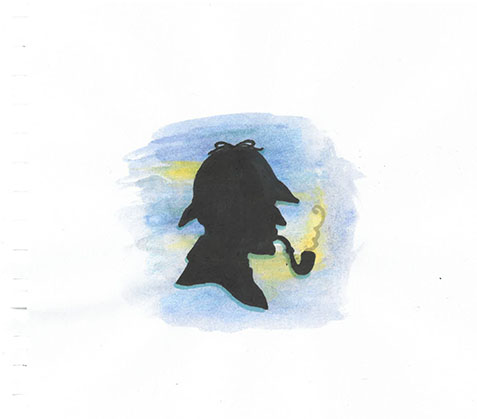
In the latest of a long line of adaptations, comedy duo Will Ferrell and John C. Reilly have decided to turn their hand to the works of Sir Arthur Conan Doyle. The upcoming Holmes & Watson is set to be released in December 2018. Will Ferrell will breathe life into Sherlock Holmes, John C. Reilly will play Watson, and Hugh Laurie will take on Sherlock’s brother Mycroft. Ralph Fiennes, best known for his role as Lord Voldemort in the Harry Potter film adaptations will play the villainous Mycroft.
Guinness World Records has listed Holmes as the “most portrayed movie character”, with more than 70 actors playing the part in over 200 films. His first screen appearance was in the 1900 Mutoscope film, Sherlock Holmes Baffled. There has also been many foreign language adaptations, most interestingly in 1984 in Japan, an anime series for children with the characters portrayed as anthropomorphic dogs.
There is a very simple reason why the brilliant detective consistently returns to our screens, particularly in the last 10 years. Money. The copyright for Conan Doyle’s works expired in the United Kingdom and Canada at the end of 1980, was revived in 1996 and expired again at the end of 2000. The author’s works are now in the public domain in those territories. All works published in the United States before 1923 are in the public domain; this includes all the Sherlock Holmes stories.
This has allowed directors to run wild with the concept in the last few years. In 2009, we saw Robert Downey Jr, and Jude Law take the lead roles, in what ended up being almost a Victorian era Bond film, the third of the franchise set to be released in 2020. Benedict Cumberbatch’s portrayal of a present day Holmes in the BBC series is probably most famous, with the series having won multiple Emmys, and has amassed a cult following online.
However the question must be asked, why the continued revivals? What is it about the detective stories that have such lasting appeal?
Human beings have a natural need to find solutions. The brain is a puzzle solving machine.How else to explain the eternal popularity of jigsaw puzzles, or Rubik’s cubes? Give the brain a problem and it will automatically try to find a solution. We are all puzzle solvers by nature. It may be even more appealing than a jigsaw puzzle or Rubik’s cube because not only does it satisfy the “puzzle solving” element of traditional puzzles, but it allows us to invoke our imagination, be gripped by the suspense of a “whodunit”, making the puzzle even more fascinating and the desire to reach the “goal” stronger.
We approach such stories differently than normal books or films. Detective fiction strengthens our memory, by changing how we think about details no matter how minor they are. As the puzzle is being put together we are forced to recall pieces that we read earlier that at the time may have seemed inconsequential but make all the difference in the conclusion. Detective stories offer a change from the normal, the release and escapism coupled with the enjoyment of solving a puzzle.
Joeseph O’Gorman
Image Credit: Megan Hannan
